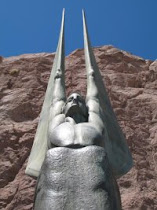Instead, it seemed easier to incorporate current issues with their past precedents, and that's worked out pretty well. Now, however, I have several new things to write about, and I just don't feel like it. Also, this one should be pretty quick, so I can finish up this backwards look and continue going forward.
I mentioned in one of my earlier posts that I believe we teach history wrong. Usually, it's a dry memorization of facts, historical timelines, and biographies. It wasn't until I was long out of school that I discovered I actually really like history. The way the subject had always been presented, though, had been a barrier to my enjoyment of it.
I could easily write a whole post on this subject, and hopefully someday I will. But for now, let me just break my idea down to the basics. History should be taught in reverse.
I don't understand why this isn't obvious. That's the way history is written; that's the philosophy behind how it is studied; why isn't it taught that way too? History is a series of connected events with causal relationships. When looking back at the past, we are always asking, "What was the cause of this effect? Why did this happen?" If we started students with right now, we could show them how things came to be the way they are. And yes, there can be multiple causes, and different opinions, and all of that stuff. But by following these causal threads in reverse, it actually breeds more questions and encourages thought and curiosity. History should be thought of in terms of "Why", not just in terms of "What." Barack Obama was elected President. In the old way, this was the end of the lesson. In my version, it would be the beginning. Why was he elected President? Why was it considered significant? What led to it happening? James Burke did a similar thing with his fantastic show Connections. Looked at this way, history can be fascinating.
So, another question: What does any of this have to do with my father's health?
Because my Dad's diagnosis was a similar, backwards-looking investigation.
Now that we have all the facts, we can put it in the proper order. While it was happening, all the doctors were grasping at small pieces of the whole. It was like that old saying about five blind men describing different parts of an elephant.
Here's how it breaks down:
- Many years ago, my Dad had prostate cancer. The prostate was surgically removed, but they followed up with some radiation treatment to make sure.
- The radiation treatment damaged his bladder, though we weren't aware of it.
- Slowly but surely, his bladder started to fill up with blood clots. As this happened, it lost effectiveness and started building up excess fluid.
- As the excess fluid built up, it caused a back up in the kidneys. Slowly but surely, the kidneys fell further behind cleaning out his system, and started to fail. The fluid continued to build up.
- My father was getting weaker and weaker, but he just attributed it to getting older.
- As the fluid continued to build up, it started to spill over into his lungs. His lungs had to work harder, so the passageways grew to accommodate more air.
- With the larger passageways, he started aspirating (which is when you drink something and it goes into your lungs instead of your stomach), which of course made the problem worse.
- My Dad starts to experience shortness of breath, and that is what sends him to the doctor. He went to his cardiologist to talk about his difficulty breathing. It was only after many tests and many specialists that this whole timeline was revealed.
But that's just the thing about history, too. When you're in the moment, how can you know if an event is significant or not? Will this pain lessen or increase? Should I go now, or wait a couple of days? Obviously, you can't know. The lesson I will try to take from this is just to be more aware.











No comments:
Post a Comment